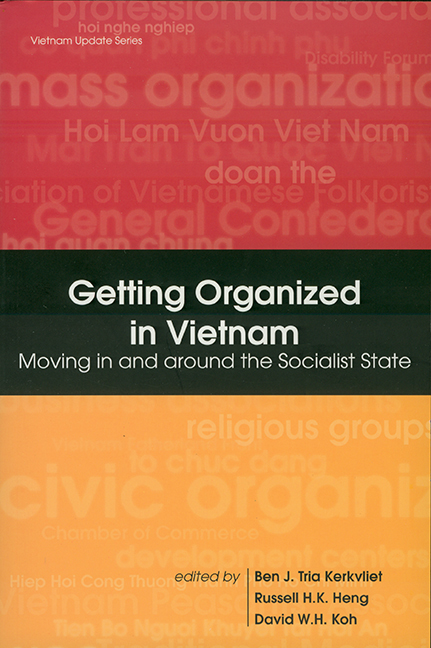Book contents
- Frontmatter
- Contents
- Preface
- Abbreviations
- Introduction: Grappling with Organizations and the State in Contemporary Vietnam
- 1 From Fence-Breaking to Networking: Interests, Popular Organizations, and Policy Influences in Post-Socialist Vietnam
- 2 Business Associations and Policy-Making in Vietnam
- 3 NGOs and Highland Development: A Case Study in Crafting New Roles
- 4 The Disabled and Their Organizations: The Emergence of New Paradigms
- 5 Authoritarian Governance and Labour: The VGCL and the Party-State in Economic Renovation
- 6 The Relationship between Civic and Governmental Organizations in Vietnam: Selected Findings
- 7 Donors, Local Development Groups and Institutional Reform over Vietnam's Development Decade
- Index
- About the Contributors
Introduction: Grappling with Organizations and the State in Contemporary Vietnam
Published online by Cambridge University Press: 21 October 2015
- Frontmatter
- Contents
- Preface
- Abbreviations
- Introduction: Grappling with Organizations and the State in Contemporary Vietnam
- 1 From Fence-Breaking to Networking: Interests, Popular Organizations, and Policy Influences in Post-Socialist Vietnam
- 2 Business Associations and Policy-Making in Vietnam
- 3 NGOs and Highland Development: A Case Study in Crafting New Roles
- 4 The Disabled and Their Organizations: The Emergence of New Paradigms
- 5 Authoritarian Governance and Labour: The VGCL and the Party-State in Economic Renovation
- 6 The Relationship between Civic and Governmental Organizations in Vietnam: Selected Findings
- 7 Donors, Local Development Groups and Institutional Reform over Vietnam's Development Decade
- Index
- About the Contributors
Summary
In the early 1990s, observers began to comment on the increasing diversity of groups and associations in Vietnam. Phan Dai Doan, a distinguished professor of history in Hanoi, marvelled in 1994 at the “abundant and complex forms of organizations” that had emerged in rural villages following the end of collectivized farming. Unlike during the agricultural collective period, he found that villagers were joining together for mutual assistance, animal husbandry, charity work, religious activities, and adult education, among other purposes. Meanwhile, Carole Beaulieu spotted what looked like NGOs (non-government organizations). People in Hanoi and elsewhere, she said, were creating “what they believed were independent organizations” and they felt free “to decide their own agenda and to raise money to act”. During the rest of the decade, evidence accumulated that the numbers and range of associations and groups were expanding.
To look at this phenomenon, scholars of Vietnam at the Australian National University and Singapore's Institute of Southeast Asian Studies made organizations the theme of the Vietnam Update conference held in November 2001. The chapters that follow began as presentations to that gathering. The conference was one of two looking at aspects of governance in Vietnam. Governance has several meanings and many features. Two aspects stood out for us: the ability of government authorities and institutions to make and implement policies and regulations that serve citizens and the country at large; and the accountability of authorities and institutions to the citizens and the public generally. We reasoned that one way to examine governance is to analyze organizations that claim to speak on behalf of certain sectors of the public, represent their interests, provide linkages between citizens and government, and enable people to hold authorities accountable. Our call for papers invited analyses of organizations in Vietnam that do these things or at least claim to. They could be government-created, government-linked, non-government, or other types of organizations, associations and groups.
- Type
- Chapter
- Information
- Getting Organized in VietnamMoving in and around the Socialist State, pp. 1 - 24Publisher: ISEAS–Yusof Ishak InstitutePrint publication year: 2003



